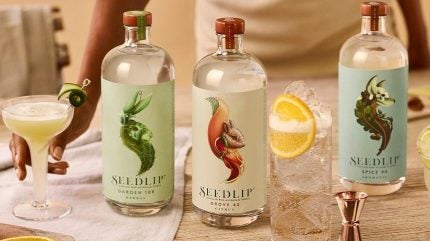
Entrepreneurs entering the fledgling low-and-no market should steer clear of emulating beverage-alcohol brands, the founder of non-alcoholic alternative Seedlip has said.
The low-and-no category remains in its early stages across markets but more brands are being launched amid growing consumer interest in moderation.
Ben Branson founded Seedlip, a non-alcoholic alternative to gin, in 2014 before selling a majority stake in the UK-based business to Diageo five years later.
He has since set up venture-studio Pollen Projects, which has launched 0.0%-abv cocktail bitters brand Seasn in the UK and is set to take product across the Atlantic to the US.
Speaking to Just Drinks, Branson said moves by existing, major beverage-alcohol brands to launch low-and-no products can drive consumer interest in the fledgling category.
However, he insisted he has “absolutely zero interest” in products that “imitate” existing alcoholic drinks.
“I can see its role and so I’m not saying it’s a bad thing. I’m just saying, personally, it does not excite me,” Branson said. “I think it is a role best fitting to the alcohol trademarks for sure. When it comes to Guinness and Gordon’s or whoever, they have a name, they’ve got kind of expertise and they’ve got scale and they can do that. And what that does is provide an entry point at scale to a mass audience.
“What I therefore don’t think there is any point in doing, any point at all, is being a new brand imitating an alcoholic category.”
Pollen Projects is set to launch Seasn in the US next month, and will announce a second brand later this year, Branson told Just Drinks.
He said the studio is “building a laboratory, and literally as we’re talking right now the walls are going up for it. That is an actual production unit that will make our second brand, which is one that I’ve probably had in my head and then in the works for probably the last ten to 12 years”.
He acknowledged the need for non-alcoholic companies to put their products in front of consumers, describing the issue as “nuanced”.
One way that non-alcoholic start-ups are trying to bring in new consumers is by launching 0.0%-abv RTDs and capitalising on a surging alcoholic RTD market.
According to analysis from GlobalData, Just Drinks’ parent, the US “flavoured alcoholic beverages” segment, which includes pre-mixed spirits, wine coolers, hard seltzers and alcoholic soft drinks in an RTD format, could be worth $52.5bn by 2027, with the potential to overtake vodka by $31.2bn and whisk(e)y by $11.1bn.



